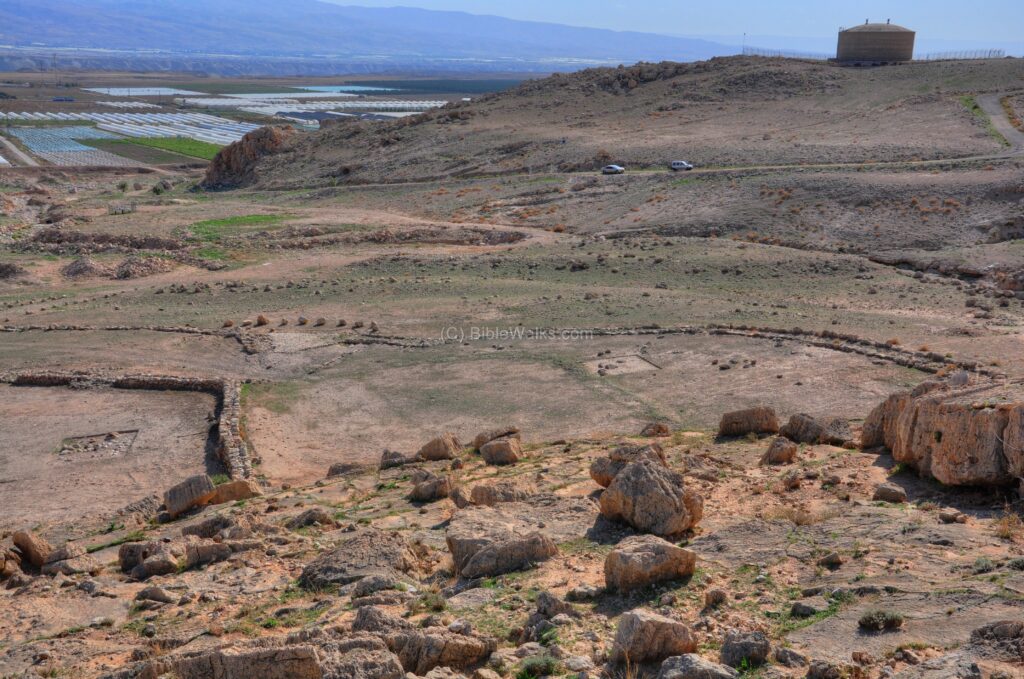For me, “injure yourselves before your enemies” summarizes what God told the Israelites to do, as soon as they set foot on the promised land, in Gilgal.
What they did in Gilgal is the subject of Joshua 5:9-12, the OT passage in the Lectionary Readings for tomorrow, the fourth Sunday in Lent.
Gilgal
Footnotes in most translations tell us “Gilgal” sounds like the Hebrew for “to roll.” Verse 9 tells us the place was named Gilgal because of what God did there. He “rolled away the reproach of Egypt” from Israel.
The words “rolled away” were spoken after all the men of Israel were circumcised there, at that time. So many men were circumcised that there was a “hill of foreskins” (Gibeath-haaraloth, Joshua 5:3).
Invasion
As far as the local people were concerned, the Israelites were invaders.
No doubt about it. It was an invasion. The locals would’ve wanted to oust the invaders, like the Ukrainians want to oust the Russians.
But there was something supernatural about the invasion. When the Israelites arrived on the East side of the Jordan river, the waters parted, and the Israelites walked across to the West side on dry land.
Fear
The locals were terrified, as we can see from the account in Joshua 5:1
As soon as all the kings … heard that the Lord had dried up the waters of the Jordan for the people of Israel until they had crossed over, their hearts melted and there was no longer any spirit in them because of the people of Israel.
The locals dared not confront the invaders, because they knew the invasion could’ve been ordered by God. Because they understood that the parting of the waters meant God was on the side of the Israelites.
Their hearts melted. They had no spirit to fight.
A lucky break?
The kings of those days, like kings of today, had spies everywhere. They were always watching the borders and the people. They had seen the parting of the waters.
But they knew the history of the Israelites – a history of slavery (“the reproach of Egypt), self-inflicted cleansing-through-killing (e.g., the golden calf incident), a history of missteps.
Surely, they were looking for a sign of weakness. Surely, they would see the hill of foreskins, all the fighting men in pain, waiting to be healed (Joshua 5:8), as the “lucky break” they needed to mount a resistance?
What were the Israelites thinking? Why would they adopt the maxim of “injure yourselves before your enemies?”
Israel’s thoughts
Negatively they knew they had the mindsets of slaves, for that is what they had been in Egypt for over 400 years; they knew they had the mindset of refugees, for they had been wanderers in the wilderness for 40 years; they knew they had a history of disobedience and punishment, especially for the sin of the golden calf.
If you’re wondering why 400+ years in Egypt, check this out: To whom did God promise territory? For more on the golden calf, check this out: Fearing and glowing is what Transfiguration Sunday is about.
Positively, they knew God had entered into a covenant with them and they had God’s laws in the form of two stone tablets, an Ark and Tent of Meeting built to designs drawn up by God Himself; they knew God had provided food for them by means of the manna which they collected every morning for 40 years; they knew God was leading them into the land he had promised to their ancestor Abraham.
They knew they could succeed only if they threw themselves into the hands of God. They knew God was testing their faith. They knew the truth of what Apostle Paul would write centuries later: “When I am weak, then I am strong” (2 Corinthians 12:10).
What reproach needs to be rolled away from us today? Is the maxim “injure yourselves before your enemies” applicable today?
To learn more about Rama, click here.


